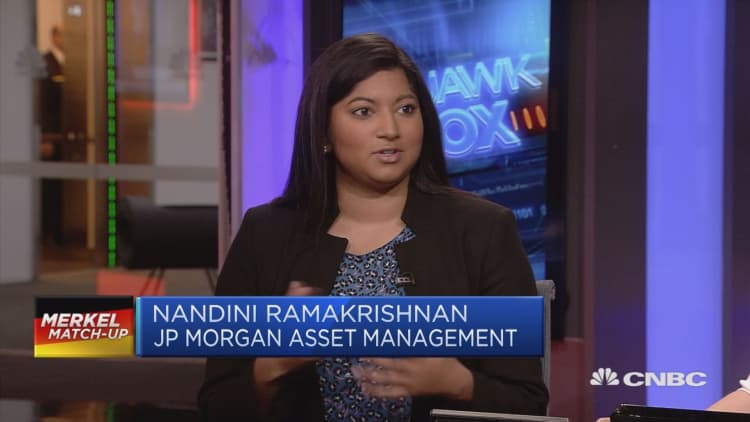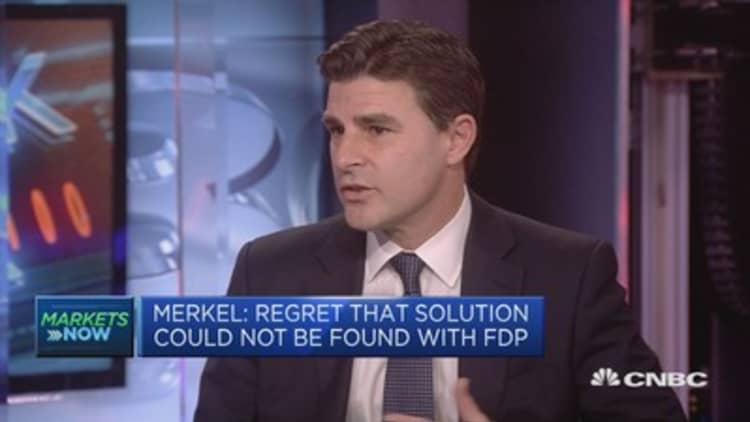Eight weeks after federal elections, it appears Europe's largest economy is in for a longer period of deep uncertainty: Complex four-way talks to form a new German coalition government collapsed late Sunday night as the political parties involved failed to reach compromise on key questions and set aside their ideological differences.
In the end, neither head-to-head meetings between party leaders, nor smaller, policy-focused discussions managed to find the needed breakthrough. Shortly before midnight, it was Christian Lindner, head of the pro-business Free Democrats, who declared the negotiations over.
"It is better not to govern than to govern wrongly," he said in a statement without the other party leaders present.
With that, Mr. Lindner brought to a sudden end four weeks of exploratory talks between Angela Merkel's Christian Democrats (CDU), their Bavarian sister party, the CSU, the environmentalist Greens and Mr. Lindner's FDP.
The prospect of an unprecedented "Jamaica" coalition – named for the parties' colors – appears to be over before it really began.
The announcement plunges Ms. Merkel, who remains chancellor until a new government can be formed, into the worst crisis of her 12 years in power. In a statement, she said she regretted the FDP's decision but promised to "do everything to see this country led through these difficult weeks." Exactly what her next step will be, however, remains unclear.

Reaching a deal between four parties with such major ideological differences was always going to be extremely difficult. As deadlines came and went, negotiations had seemed to intensify tensions on all sides.
In the end, stubborn differences of opinion remained too great on major policy questions, above all on migration and climate change.
What had brought these parties together in the first place was a willingness to put country – and stability – before party ideology.
Dialogue over the last month was aimed at determining whether a coalition was possible, after federal elections held September 24 ended indecisively. If a preliminary agreement had been made Sunday, formal talks would have begun to draw up a formal program for government.
Instead, the blame game has already begun. Sources in the FDP say the party believed that agreeing to the program offered by the CDU and Greens would have been a humiliation for the party. Mr. Lindner said his party's voters expected a course correction.
The potential coalition partners, however, slammed Mr. Lindner for calling a premature end to the talks and abdicating his responsiblity to help govern. "A culture of compromise is essential for a functioning democracy," Greens co-leader Cem Özdemir said.
Without an agreement, snap elections are a possibility, but these may produce an outcome just as inconclusive as the last. Alternatively, Angela Merkel's CDU may attempt to form a minority government with just one of the negotiating parties. Her party planned to hold internal discussions on the way forward Monday morning.
More from Handelsblatt Global
Merkel on Thin Ice as 'Jamaica' Eludes Germany
Merkel Swipes At Trump On Climate
Where the Streets Have No New Names
The leader of the center-left Social Democrats, Martin Schulz, confirmed Sunday that his party would not continue the current "grand coalition" government with the CDU.
"Voters have rejected the current coalition," he said, referring to the fact that the CDU and SPD together were handed their worst result in post-war Germany. That stance was confirmed again late Sunday after the coalition talks had collapsed.
All parties, however, fear that a failure to reach agreement could boost support for the far-right Alternative for Germany party, which saw a surge in support in September's elections.
With Ms. Merkel keen to clinch a historic fourth term in office, the Christian Democrat deputy chair, Julia Klöckner, had called Sunday afternoon for one last push to find agreement: "We have to look at the alternatives, and then all pull ourselves together and work something out."
In a tweet Sunday night she derided Mr. Lindner's announcement as "well-prepared spontaneity," criticizing him for seeking to get out in front of the other parties.
Relations between party representatives have been tense, with mutual accusations of lack of trust, personal attacks and leaks to the press.
The Free Democrats had been particularly angered by remarks by lead Green negotiator Jürgen Trittin in a German Sunday newspaper, in which he said all concessions had come on the Green side. "He's just shooting the whole thing down. You can't work like that," said one FDP negotiator.
The weekend's final talks focused on contentious issues: the environment and migration. In the election campaign and since, the Bavarian CSU has insisted on an annual upper limit of 200,000 for asylum seekers.
The Greens were opposed to any hard limit, but were said to be prepared to acknowledge the figure as a non-binding target. They did however insist on the right of existing refugees to bring family members to Germany. Anything else would be "inhuman," said Mr. Trittin. The CSU, fearful of leaking support to the AfD, were holding to their hard line.
The environment was another sticking point, with the Greens looking to force an early end to coal-fired power stations, but other parties were reluctant to make public targets, for fear of the negative impact on coal-mining regions and on the economy more generally.
Underlying these policy differences were anxieties in all parties about their position in Germany's shifting political landscape, exacerbated by previous bad blood. The FDP was burned by its last experience of coalition with Ms. Merkel, from 2009 to 2013, and wanted cast-iron promises on its core issues of education and tax reform.
There are also profound cultural differences between the Greensand the culturally conservative CSU. But both parties have their own internal tensions. For the environmentalists, the pressures of negotiation have brought to the fore old strains between the party's "realist" wing and its more left-wing elements.

The Bavarian CSU saw its support plummet to below 40 percent in September's general election: frightening levels for a party which sees itself as a natural party of regional government. State elections next year in Bavaria promise to be a crucial test.
With leader Horst Seehofer profoundly weakened, possible successors have been using coalition talks to stake the ground for their own ambitions. Mr. Seehofer, however, declared he was disappointed Sunday night and said a deal had been "within our grasp."
Although Ms. Merkel's CDU arguably had most to gain from successful coalition talks, her party also has internal tensions in the wake of a deeply disappointing election. Ms. Merkel's authority is not what it once was. Although her leadership is not in question, senior figures within the party have called for deeper reflection on the party's future direction, and an "overhaul in personnel."
With so much antagonism in the mix, some observers had long questioned whether a CDU-CSU-Green-FDP coalition could ever be coherent, even if a program had been worked out. Germany's president, Frank-Walter Steinmeier, had called for optimism, reminding all sides of their responsibilities. In the end, it appears that sense of responsibilty wasn't enough to bridge the gap.
Thomas Sigmund is Handelsblatt's Berlin bureau chief. Daniel Delhaes reports on politics, transport and airlines from Handelsblatt's Berlin office. Silke Kersting reports for Handelsblatt from Berlin, focusing on consumer protection, construction, environmental policy and climate change. Brían Hanrahan and Christopher Cermak adapted the article for Handelsblatt Global. To contact the authors: sigmund@handelsblatt.com, kersting@handelsblatt.com, delhaes@handelsblatt.com

